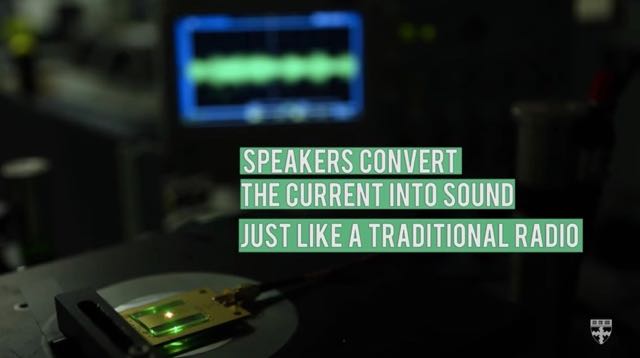(Source: NPR)
Physicists at Harvard have built a radio receiver out of building blocks the size of two atoms. It is, almost certainly, the tiniest radio receiver in the world.
And since it’s a radio, it can play whatever you want to send its way, including Christmas music, as this video by the Harvard team that designed it makes clear:
Click here to view on YouTube.
NPR then quotes from The Harvard Gazette where Leah Burrows, of Harvard’s John A. Paulson School of Engineering and Applied Sciences, explains how the tiny radio works:
Radios have five basic components: a power source, a receiver, a transducer to convert the high-frequency electromagnetic signal in the air to a low-frequency current, a tuner, and a speaker or headphones to convert the current to sound.
In the Harvard device, electrons in diamond NV centers are powered, or pumped, by green light emitted from a laser. These electrons are sensitive to electromagnetic fields, including the waves used in FM radio. When NV center receives radio waves. it converts them and emits the audio signal as red light. A common photodiode converts that light into a current, which is then converted to sound through a simple speaker or headphone.
An electromagnet creates a strong magnetic field around the diamond, which can be used to change the radio station, tuning the receiving frequency of the NV centers.
Shao and Lon?ar used billions of NV centers to boost the signal, but the radio works with a single NV center, emitting one photon at a time, rather than a stream of light.
The radio is extremely resilient, thanks to the inherent strength of diamond. The team successfully played music at 350 degrees Celsius — about 660 Fahrenheit.[…]


Okay, reading that gave me a headache! I wonder when it will be available on Amazon?
Merry Christmas and Happy Holidays to all.
Well you know how it goes… we want AM and SW and SSB and a sync detector and before you know it you schlepp around a radio that has grown to at least 12 or 13 atoms…what a drag!
Still prefer my boatanchor :).
Just a little levity for the holidays hihi.
His you-tube is not clear, Is the transducer (speaker) it’self made from diamond or is this just the radio section?